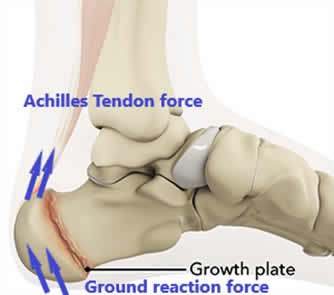This condition often occurs during rapid growth periods around puberty, we see a peak of symptoms appearing at different ages of the sexes, being:
- Girls: 8yrs – 11yrs
- Boys: 10yrs – 13yrs
Symptoms of Calcaneal Apophysitis
A child may present with pain in one or both heels, during or after exercise. Symptoms are often worst on rising in the morning or after rest following activity.
A child may be observed to be limping or become hesitant to be involved in activities that involve running or jumping.
Calcaneal Apophysitis can often be confirmed though a positive ‘squeeze test’. X-ray imaging of the area is generally unhelpful and not required.
Common causes of Calcaneal Apophysitis
- Sudden increases in height or weight associated with growth spurts.
- Rapid increases in sport and activity, especially explosive activity like running and jumping.
- Playing or training on hard surfaces
- Limited ankle movement, often caused by calf muscle tightness.
- Inappropriate footwear for a chosen activity.
- Possibly poor biomechanics and excessive rearfoot pronation. (There are varying opinions on how this may contribute to the symptoms).
How can Calcaneal Apophysitis treated?
The good news is that this condition is self-limiting and will eventually resolve, however, it is difficult to know how long this may take. Limiting exercise or sporting activities can reduce the discomfort, however this option is often not welcomed by active kids. There are several other specific treatment options that can be used to relieve the irritation and get the child more comfortable and back to sport sooner. For further information, assessment and an acute diagnosis, book an appointment with one of our experienced Podiatrists today!

